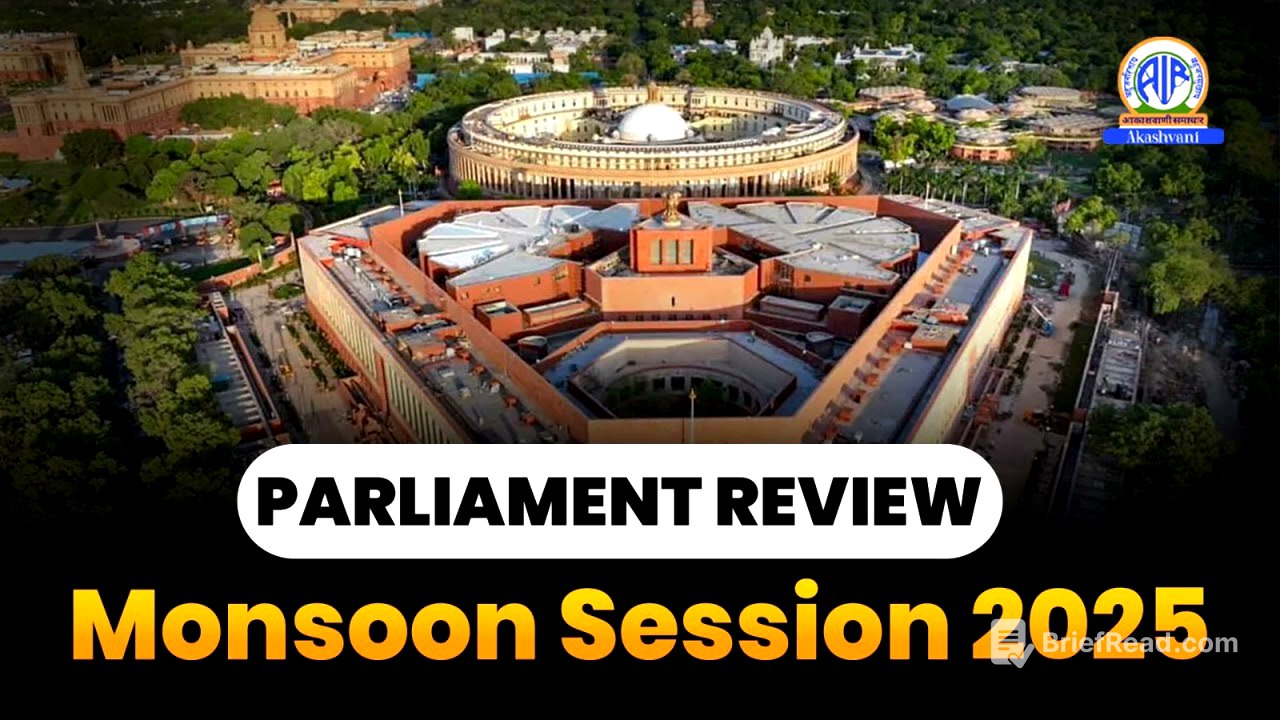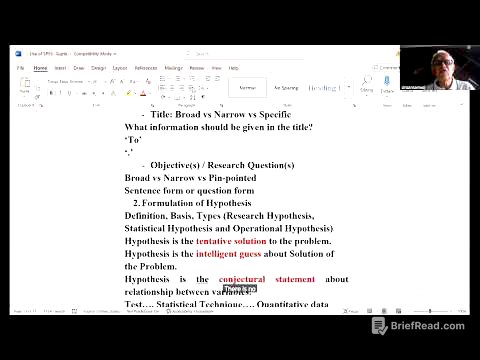TLDR;
This news report covers the disrupted parliamentary proceedings in both the Lok Sabha and Rajya Sabha due to opposition protests regarding the discussion on operation Synindur and voter role revision in Bihar. Key points include the introduction of the National Sports Governance Bill and the National Anti-Doping Amendment Bill, updates on the bullet train project, measures to handle medical emergencies in railways, and the resolution of public and pension-related grievances. Additionally, the report addresses the pace of National Highways construction, identification and rectification of black spots, and regulations concerning old vehicles. Finally, it provides data on vacancies and recruitment in central armed police forces.
- Disrupted parliamentary proceedings due to opposition protests.
- Introduction of the National Sports Governance Bill and the National Anti-Doping Amendment Bill.
- Updates on the bullet train project and railway medical emergency measures.
- Resolution of public and pension-related grievances.
- Information on National Highways construction, black spot rectification, and vehicle regulations.
- Data on vacancies and recruitment in central armed police forces.
Lok Sabha Proceedings Disrupted [0:04]
The Lok Sabha faced disruptions for the third consecutive day due to noisy protests by opposition parties. These parties demanded a discussion on operation Synindur and voter role revision in Bihar. Speaker Omaha expressed his displeasure, stating that the MPs were behaving as if they were on the streets and warned that he would be forced to take decisive action if they continued their disruptive behaviour. Despite his appeals, the opposition members ignored his pleas, leading to multiple adjournments of the House.
Introduction of Sports Bills [2:04]
Union Sports Minister Manukmania introduced the National Sports Governance Bill in the Lok Sabha. This bill proposes a board with extensive powers to oversee the functioning of sports federations, including the BCCI. The bill aims to create a stringent system of accountability, requiring all national sports federations (NSFs) to attain recognition from the National Sports Board (NSB) to access central government funding. Another key feature is the proposal for a national sports tribunal with the powers of a civil court to decide disputes related to sports federations and athletes, with decisions only challengeable in the Supreme Court. The bill also brings recognised national sports bodies under the Right to Information (RTI) Act.
BCCI's Response to the Sports Bill [3:05]
BCCI Vice President Rajiv Shupla stated that the BCCI members would study the bill and its clauses and discuss it with the government. The ministry has insisted that the BCCI, now part of the Olympic movement, will have to comply with the bill's provisions once it becomes an act. The NCSB will consist of a chairperson and members appointed by the central government, possessing expertise in public administration, sports governance, and sports law. The bill aims to improve the governance of sports bodies, achieve better results in sports, and reduce disputes, addressing factionalism and administrative interventions that adversely affect sports development in India.
Key Provisions of the National Sports Governance Bill [4:42]
The NSB has the authority to derecognise national bodies that fail to hold elections for their executive committee or commit gross irregularities in election procedures. It can also take action against bodies that fail to publish annual audited accounts or misuse public funds, after consulting with the relevant global body. The bill also provides for a national sports election panel consisting of former members of the election commission of India or state election commissions.
National Anti-Doping Amendment Bill and Railway Updates [5:18]
Mandi also introduced the National Anti-Doping Amendment Bill 2025, which incorporates changes sought by the World Anti-Doping Agency (WADA). Railway Minister Ashwini Vashno informed the Lok Sabha that the Gujarat portion of the bullet train corridor between Vapi and Sabarmati is planned to be completed by December 2027, with the entire project expected to be over by December 2029. The Mumbai Ahmedabad high-speed rail (MHSR) project is under execution with assistance from Japan, passing through Gujarat, Maharashtra, and Dadra and Naga Havi, with 12 planned stations.
Bullet Train Project Details and Railway Medical Emergency Measures [6:43]
The total estimated cost of the bullet train project is approximately 1 lakh and 8,000 cr rupes, with 81% funded by the Japan International Corporation Agency (JICA) and the balance through equity contributions from the ministry of railways and the governments of Maharashtra and Gujarat. A cumulative financial expenditure of 78,839 cr rupes has been incurred on the project till June 30th. Railway Minister Shini Vashna also informed the Lok Sabha that more than 16 lakh frontline rail employees have been trained for 3 years to handle medical emergencies at stations and in trains effectively.
Public and Pension Grievance Redressal [7:45]
Union Minister of State for Personnel Jetra Singh said in Lok Sabha that more than 1.25 cr public grievances have been redressed since 2020 through the central public grievances redressal and monitoring system (CP grants). Over 55,000 pension-related grievances were resolved through the centralised pension grievances redress and monitoring system (CEN grants) portal between January and July 15 this year. The rate of grievances redressed on the CPEN grants portal has decreased from 35 days in January 2025 to 20 days in July 2025.
Rajya Sabha Proceedings Disrupted [8:30]
Proceedings of the Rajya Sabha were adjourned for the third day of the monsoon session due to continued uproar and protests from opposition members demanding a discussion on the special intensive revision of electoral roles in Bihar. The upper house faced multiple adjournments after opposition protests over the Bihar voter list revision issue. Despite attempts to conduct business, the house was adjourned for the day after witnessing similar protests.
Opposition Demands and House Adjournments [9:20]
Shipping and waterways minister Sanandanda Sonoval moved the carriage of goods by sea bill 2025 for discussion, but opposition members continued their protest, demanding a discussion on the issue of voterless revision in Bihar. Opposition members raised slogans against the special intensive revision of electoral roles in Bihar and demanded that leader of opposition Malik Jan Kh be allowed to speak. The house was adjourned for the day as the protests continued.
Rejection of Adjournment Notices and Zero Hour Mention [9:48]
The opposition members created a role in the house following the rejection of their adjournment notices demanding discussion on various issues, including revision of electoral roles. Deputy chairman Harivanch informed that he had received 25 notices under rule 267 demanding discussion on revision of electoral roles, demolition of slums in Delhi, alleged discrimination against migrant workers from Bengal, and air safety. The chair rejected all the agendment notices, leading to huge protests. The house allowed MDMK member Viko to raise his zero hour mention regarding increasing incidents of arrest of Indian fishermen by Sri Lanka.
National Highways Construction and Black Spot Rectification [11:31]
Union Road Transport and Highways Minister Nitan Gutkari said the pace of National Highways construction during 2023-2024 stood at 34 km per day. All the national highways development projects, including the development of access-controlled high-speed corridors (HSC's) and expressways, are planned in line with PMGishaki national master plan (NMP). Till date, 13,795 black spots have been identified on national highways in the country, with short-term rectification completed on 11,866 black spots and long-term rectification completed on 5,324 black spots.
Highway Projects and Vehicle Regulations [12:33]
The Dhadun Delhi access-controlled highway is targeted for completion by October 2025, with a total capital cost of about 12,000 cr rupees. The government has not prohibited flying of old vehicles, but the National Green Tribunal (NGT) banned the use of diesel and petrol vehicles beyond a certain age in the National Capital Region (NCR). The vehicle scrapping policy of the government does not ban the use of 15-year-old vehicles. The Supreme Court has directed the transport departments of the states in the NCR that all diesel vehicles more than 10 years old and petrol vehicles more than 15 years old shall not apply.
Vehicle Scrapping Policy and Vacancies in Central Armed Police Forces [13:27]
The government has formulated the voluntary vehicle fleet modernisation program (VVMP) of vehicle scrapping policy for creation of an ecosystem to phase out unfit and polluting vehicles. There were 1 lakh and 9,000 vacancies in the central armed police forces and Assam rifles as of January 1st, with recruitment for 72,689 post ongoing. The sanctioned strength in these forces went up from 10 lak 4,980 in 2021 to 10 lak 67,110 in 2025.









